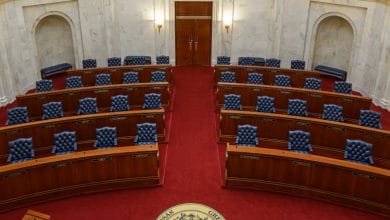 When we first heard that Senator Jim Hendren, the leader of the Arkansas Senate, was considering a rule change for more transparency in the Senate we were hopeful. But, when we read his statement, we were disappointed. It was not so much about Senators wanting to open records to the public on important votes as it was about an internal squabble over a leadership vote.
When we first heard that Senator Jim Hendren, the leader of the Arkansas Senate, was considering a rule change for more transparency in the Senate we were hopeful. But, when we read his statement, we were disappointed. It was not so much about Senators wanting to open records to the public on important votes as it was about an internal squabble over a leadership vote.
Still, if some Senators are talking about openness in this one tiny instance, maybe they will address the much more important issue of recording votes on legislation and making the votes readily available to the public. Legislators routinely kill good legislation in committee without the public ever knowing who voted for or against.
Talking about a Senate leadership vote is kind of like an inside baseball discussion, there is a limited audience interested in it. We will only give a brief explanation of the controversy to bring into contrast the much bigger issue of votes that are never recorded on important legislation. Their policy leaves you in the dark on which legislators are responsible for stopping good legislation. Finally, we will discuss how the COVID-19 pandemic makes recording and posting the votes on legislation all the more important.
SENATOR HENDREN’S LIMITED CALL FOR TRANSPARENCY
On social media Senator Jim Hendren addressed Senator Bart Hester saying, “Senator Hester, I also think all leadership votes should be public moving forward.”
Here is what happened. The Senate held an election for the 2021 top Senate leadership position, President Pro Tempore of the Senate. Senator Bart Hester was nominated by the Senate Republican Caucus. Republicans in the Senate have enough votes to elect whoever they want. When it came time for the full Senate to vote on the next leader, Senator Jimmy Hickey, Jr. ran against Hester. Hickey, also a Republican, did not run in the caucus meeting. Hickey was the surprise winner based on an unlikely coalition of some of the most conservative Republican Senators and the Democrat Senators.
Under Senate rules the vote for President Pro Tempore is a secret ballot. Some backers of Hester want to end the secret ballot which would make it less likely a Senator would buck the caucus.
Now that some senators are talking about transparency in votes, let’s see if they really are for a policy of public transparency or if the word “transparency” is just being used as a weapon in an internal squabble.
KEEPING THE PUBLIC IN THE DARK ON VOTES ON LEGISLATION.
The Arkansas General Assembly (the legislature) has a nice web page where you can look up how your state Senator and State Representative voted on legislation important to you. This information lets you see whether your legislator’s rhetoric matches his or her actual votes (at least, some of their votes).
Most votes before the full Senate or House are recorded as roll call votes. The House uses a machine to speed the process. Most votes in committees are not roll call votes. Even when a committee has a roll call vote it is unlikely the public will find out how their legislators voted. The public is left in the dark about most committee votes despite those votes being just as important or, in some cases, more important than floor votes.
What lobbyists figured out decades ago is – a good place to kill a do-good bill is in a committee. Lobbyist know the public rarely finds out how a legislator voted in committee and that makes it easier to convince a legislator to kill a bill in committee than on the floor of the Senate or House.
Committee votes are normally by voice vote. The committee chair will ask all those for the bill to say “Aye” and those against to say “No.” The chair then declares the result based on which group sounded the largest. This means there is no record of how a legislator voted. With no record of the vote, a legislator who helped kill a good bill in committee might still tell a constituent, “Sorry it didn’t get out of committee; I was considering voting for it on the floor.”
Not every committee vote is a voice vote. Sometimes a committee member will call for the vote to be a roll call vote. When there is a roll call vote each legislator’s name is called, and the legislator’s vote or failure to vote is recorded. Most roll call votes occur only after a voice vote is taken and the result sounded close.
Even if a roll call vote is taken in committee, it is unlikely you will ever know about it. That is because the results are not posted anywhere. The legislature’s website only lists floor votes. From the website you cannot tell when or how many times a bill was voted on or whether there was a roll call vote. If a bill is passed out of committee you will only see a notation that the bill was transmitted back to the full chamber.
It is possible to get a copy of a roll call vote, but you must contact legislative staff and request it. The problem is – in most instances you aren’t going to know whether the bill came up for consideration or whether the voting method was a roll call vote or a voice vote. Therefore, even most roll call votes remain hidden in the shadows.
But, unlike you, the big lobbyists will always know the results of committee votes. The big money lobbyists are always present in committee to keep up with how legislators voted. If it is a voice vote they have their eyes on key legislators. If it is a roll call vote they will mark down how each legislator voted or will contact legislative staff at the end of the committee meeting to request a copy of the roll call vote.
In 2017, Conduit started requesting the roll call votes on important bills we were tracking. The votes we were most interested in were roll calls where a bill failed because that was likely the final action on the bill.
At the end of a regular legislative session Conduit publishes a spreadsheet of how legislators voted on key issues. The 2017 spreadsheet included some committee roll call votes where a good bill was killed in committee. Big government legislators HOWLED that it was unfair to count their committee votes against them since only committee members were judged on those votes. Our position is a vote killing a bill in committee is just as important as one killing a bill on the floor of the Senate or House. It would be unfair to the public to let those votes go unseen and unaccounted for.
Legislators who want to keep their committee votes hidden will tell you a roll call vote in the committee takes too much time. In other words, they will be telling you their time is too valuable to bother with letting the public know what they are doing. How long do you think it would take to do a roll call in a Senate committee? Senate committees only have eight members. House Committees only have twenty members.
How much longer do you think it would take legislative staff to post the results of roll call votes on the legislative web page. With an iPad or tablet it would be just a few clicks away.
COVID-19 AND RECORDING THE VOTE
We hope the world will be back to normal long before the 2021 legislative session begins in January. But if social distancing rules are in place then, it will be difficult for the public to be present and active at legislative committee meetings. Without word of mouth from grass roots groups the public would know even less about committee votes.
Under social distancing rules would committee meetings still be held in the capitol where committee rooms are wired for video? Or will we lose out on that too?
While committee video is great for watching committee discussion, it is not of much help in following votes. Being in a committee meeting and watching your legislator’s response to a voice vote or roll call vote is hard. Trying to do it from watching a video is nearly impossible because of camera angles and location of microphones.
The public is already kept in the dark about most committee votes. Social distancing would make it even worse.
OPPORTUNITY FOR REFORM
With transparency in voting being an issue in the Senate (at least with the leadership vote) maybe the Senate will tackle the lack of recording and publishing committee votes.
Conduit will continue to advocate for recording all the votes on legislation and advocate for posting them on the legislative website! If you agree, why don’t you tell your legislator?







Is there any way these articles can be shared on Facebook? Y’all are doing a great job and more people need to know about this stuff.
Good report…very straightforward. When our legislators are elected to public office it is by secret ballot and apparently they think that is OK.
Thank you! I also think the public should know how committee members vote.
And I would like to know the history of all of the issues referred to the voters as ballot issues, those put on the ballot by the legislature as well as those through citizens initiatives and signature gathering over the last 40 or 50 years.